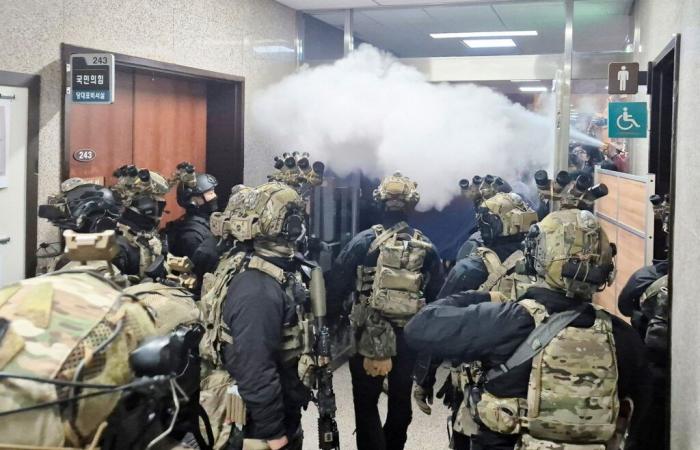The announcement was a bombshell Tuesday evening. At 10:30 p.m., live on television, the president Yoon Suk Yeol announces the immediate establishment of martial law. Using his usual rhetoric, the conservative head of state, faced with numerous controversies and at his lowest in the polls, explains that he wants to protect the people from his “pro North Korea” opponents who, according to him, would try to paralyze his government and the constitutional order. As soon as his declaration was made, helicopters began to fly over the streets of Seoul and the military and police were sent to the National Assembly to counter anyone who tried to oppose the president's orders. According to martial law, tAll political activities are in fact banned and the media are placed under government surveillance.
Faced with growing tension, opposition elected officials reacted quickly. Ignoring the risks involved, they set off towards the National Assembly. Their goal is clear, to vote against martial law, as the Constitution authorizes them to do. But to enter the building, the deputies must first pass through the hedge of soldiers who are trying to block the doors. Live on television, citizens then see their politicians climb the gate of the Assembly to make their way through, then barricade themselves with desks and chairs to force the soldiers back.
The rest after this ad
Fortunately, in the surrounding chaos, no one is injured. The soldiers, sometimes young people in full military service, do not use force. A video even shows one of them apologizing as he leaves the scene later that night. On social media, former President Moon wrote: “ Democracy in the Republic of Korea is in dire straits ». The predecessor of Yoon Suk Yeol then enjoins the soldiers not to make the mistake of protecting the application of martial law.
The rest after this ad
Elected officials against the president
In an emergency, the deputies managed to vote unanimously against martial law, 190 votes to 0. The Constitution stipulates that the president must comply with the vote, if he refuses, the Assembly can launch a dismissal procedure. Caught in his own trap of a failed coup, Yoon Suk Yeol finally, at 4:30 a.m., officially lifted martial law. Outside, the protesters who have gathered chant for his departure as the soldiers are sent home, heads bowed.
Never, in more than 40 years, has the country experienced such a political crisis. And this should last. After the chaos of the night, the president's office announced that it had resigned. Cho Hee Dae, Chief Justice of the Supreme Court of Korea informs him that an investigation will be opened into the procedures which were followed to declare martial law. According to media reports, the president did not receive approval from his cabinet to make his declaration and did not communicate his intentions, particularly to his Prime Minister. If it is established that Yoon Suk Yeol did not respect the laws, he could be prosecuted for insurrection or treason.
The rest after this ad
The rest after this ad
In the meantime, the opposition Democratic Party announced on Wednesday that the president now has 48 hours to resign, otherwise he will launch an impeachment procedure which has every chance of succeeding. The country, marked by a violent military dictatorship until the 1980s, is already mobilized to call for his departure. There Korean Confederation of Trade Unions called for an indefinite strike of workers while the media, gathered in front of the Korea Press Center, are calling for his resignation. At the conference, representatives of the press reaffirmed the unequivocal opposition « to the martial law decree which, although short-lived, caused sudden chaos and called into question South Korea's democratic principles ».






